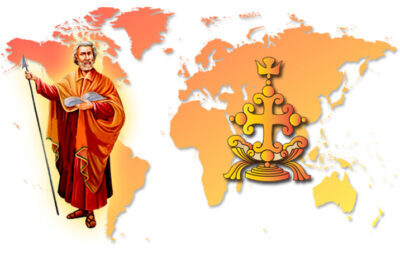Second Sunday of Easter
Sunday of Divine Mercy
April 16, 2023 – Year A
Readings: Acts 2:42-47 / Ps 118 / 1 Pt 1:3-9 / Jn 20:19-31
by Rev. Dan Kelly, Guest Celebrant
Last Sunday’s gospel describes the first hint of the apostles’ understanding of the Resurrection. The women went to the tomb to anoint the Body and thought that somebody had taken the Body away. Then when Mary Magdalene went there, she asked a person who she thought was the gardener (but was in fact Jesus), who had taken away the Body of Jesus away.
But the other apostles were skeptical. Remember the story of the two disciples who were walking a couple miles distant from Jerusalem to the town of Emmaus, and they were discussing all the things that had happened. Jesus walks along and begins to explain all the scriptures, why this had happened. Those two disciples invite Jesus to have supper with them, because it was the end of the day. But those disciples didn’t know it was Him. It was not until Jesus took the bread and blessed it.
What became of the apostles? All except John, the youngest apostle, were martyred. After the crucifixion, John the apostle took the Blessed Virgin Mary into his home as his mother, as Jesus commended him from the cross. Everywhere around the Mediterranean that John went to preach, she accompanied him, and we believe she died in Ephesus, Turkey.
Two apostles were both named James: James the Less and James the Greater, based on their respective ages. One James missioned himself after the Resurrection to the Roman province of Santiago, Spain, and he preached there and did wonderful work, calling people to the Faith, explaining all about Jesus, and then preaching and celebrating the Eucharist. Eventually, he was martyred by the Romans in Spain. His remains are believed to be there in Santiago today.
The other James became bishop of Jerusalem. He also was martyred.
Thomas figures in our scripture today. He kind of gets a bum rap: Doubting Thomas, as if he did something wrong. Thanks be to God that he had that doubt, because he expresses what we have in our own lives today: the doubts about things in our own life. Are my prayers being heard? Why doesn’t God answer me? Why is my son or daughter not following the example I give? These doubts as to whether we have the attention of God and His coming into our lives.
So thanks be to God that we have Thomas saying, I’m going to want to see this in action. When he realizes and touches the Body of Jesus, he exclaims, “My Lord and my God!” After which, Jesus asks for something to eat, to further confirm that He is not a ghost by eating baked fish or other food. When we have the elevation of the sacred Eucharist, the Body and Blood of Jesus Christ, you can also say, “My Lord and my God!”
After the Resurrection of the Lord and His Ascension into heaven, after the coming of the Holy Spirit at Pentecost, the apostles spread out among the Middle Eastern countries. Thomas gathered some others and went to present-day Jordan and into Syria, and began to teach about Jesus Christ, and to bring the Faith to the people in the northwestern part of Syria, where they developed an Eastern form of the Mass.
Thomas then learns about India and people there who yearned for the Faith. So Thomas made the very long trek to the south of India, to the modern state of Kerala. He preached the Gospel there and formed a liturgy for them, too, based on the Syriac liturgy and vestments. These Christians were the Malabar people. To this day, we have Syro-Malabar Catholics, even in the United States, using the liturgy that St. Thomas developed for them.
Thomas apparently went to other areas in the south of India and met people who were not in favor of what he was teaching to the people of Kerala, and he was eventually martyred.
So thanks be to St. Thomas, who helps us in our faith, even in our doubts.
 540-586-8988
540-586-8988 

